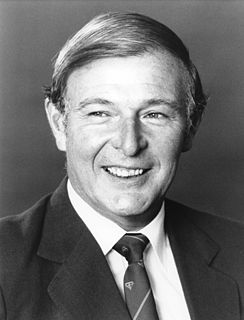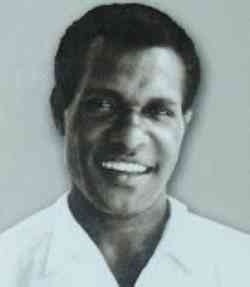Related Research Articles

John Douglas Anthony, was an Australian politician. He served as leader of the National Party of Australia from 1971 to 1984 and was the second and longest-serving Deputy Prime Minister, holding the position under John Gorton (1971), William McMahon (1971–1972) and Malcolm Fraser (1975–1983).

The People's Progress Party is a political party in Papua New Guinea.
The Papua New Guinea Country Party is a political party in Papua New Guinea. It was founded in 1974.

General elections were held in Papua New Guinea between 18 June and 9 July 1977, the first since independence from Australia in 1975. The Pangu Party led by Prime Minister Michael Somare emerged as the largest in the National Parliament. Somare subsequently formed a coalition government with the People's Progress Party (PPP) and several independent MPs. Voter turnout was 60.3%.

Nahau Rooney was a Papua New Guinean politician. From 1977 to 1987 she was a member of the newly founded post-independence National Parliament of Papua New Guinea.

John Momis is a Bougainvillean politician who served as the President of the Autonomous Region of Bougainville in Papua New Guinea between 2010 and 2020.
Iambakey Palma Okuk was an independence leader in Papua New Guinea and served as Deputy Prime Minister, the nation's first Minister for Agriculture and Fisheries, and repeatedly in the capacity of Minister of Transport, Minister of Primary Industries and Opposition Leader. He is known as Papua New Guinea's "most colourful and controversial politician". Okuk first led protests against unfair labor practices, and then once elected to office, worked to reserve sectors of the economy for citizens as a method of returning a complex economic role to Papua New Guineans. In the post-independence decade, Okuk built a coalition of minority political factions which forced a successful change of government, in which he became Deputy Prime Minister.
Edward Ramu (Ted) Diro GCL CBE is a Papua New Guinean politician and soldier.
This is a list of members of the National Parliament of Papua New Guinea from 1997 to 2002, as elected at the 1997 election.
This is a list of members of the National Parliament of Papua New Guinea from 1992 to 1997, as elected at the 1992 election.

General elections were held in the Territory of Papua and New Guinea between 19 February and 11 March 1972. They saw the election of the country's first female MP, Josephine Abaijah.
Sir Sinake Giregire was a Papua New Guinean businessman and politician.

Paulus Arek was a Papua New Guinean politician and trade unionist. He served as a member of the House of Assembly between 1968 and 1973, and as Minister for Information from 1972 to 1973.

Awali Ungunaibe was a Papua New Guinean chief and politician. He served as a member of the House of Assembly between 1972 and 1975.

Koriam Michael Urekit was a Papua New Guinean cargo cult leader and politician. He served as a member of the House of Assembly and National Parliament from 1964 until his death.
Oala Oala-Rarua was a Papua New Guinean educator, civil servant, trade unionist, politician and diplomat. He served as a member of the House of Assembly and Assistant Minister for the Treasury between 1968 and 1972, later becoming the first Lord Mayor of Port Moresby and High Commissioner to Australia.

Buaki Singeri was a Papua New Guinean politician. He served as a member of the House of Assembly and National Parliament from 1972 until 1977.

Henry Charles Humphreys was an English-born Papua New Guinean politician. He served as a member of the National Parliament in two spells between 1972 and his death.

Sir Joseph Nombri was a politician, administrator and diplomat in Papua New Guinea (PNG). He played an important role in events leading up to PNG's independence in 1975 and later became the country's ambassador in Tokyo.

Sir Ebia Olewale (1940–2009) was a politician in Papua New Guinea (PNG). He was elected as a member of the House of Assembly of Papua and New Guinea in 1968 and went on to hold several ministerial positions during the period of self-governance and after PNG's independence in 1975, including that of deputy prime minister. He was knighted in 1983 and served as chancellor of the University of Goroka from 2000 to 2006. From 2002 until his death, he was a director of the Papua New Guinea Sustainable Development Program.
References
- ↑ "Timeline of key events: Papua New Guinea's road to independence". Australian Broadcasting Corporation. 16 September 2015. Retrieved 7 April 2017.
- ↑ "About Our Parliament". National Parliament of Papua New Guinea. Archived from the original on 27 July 2015. Retrieved 7 April 2017.
- ↑ "Papua New Guinea Election Results 1972–2012" (PDF). Development Policy Centre, Australian National University. Retrieved 21 March 2017.
- ↑ Arek, Paulus (1929–1973). Australian Dictionary of Biography. National Centre of Biography. Retrieved 9 May 2017.
- ↑ Daro, Boio Bess (1976). The Papua Besena movement: Papua dainai, tano dainai, mauri dainai. Institute of Applied Social and Economic Research. p. 31.
- ↑ Former MHA back in House Papua New Guinea Post-Courier, 30 October 1973
- ↑ Sasakila, victim of the government juggernaut Pacific Islands Monthly, November 1976, p. 15
- ↑ "Justice for Sasakila". Papua New Guinea Post-courier . International, Australia. 10 November 1976. p. 2. Retrieved 13 March 2020– via Trove.
- ↑ "Auki, In the matter of [1973] PGCDR 1; [1973] PNGLR 243 (8 August 1972)". Papua New Guinea Law Reports. PacLII. Retrieved 7 April 2017.
- ↑ "The Australian Quarterly". 45–46. 1973: 110.
{{cite journal}}: Cite journal requires|journal=(help) - ↑ PNG election Pacific Islands Monthly, January 1974, p. 11